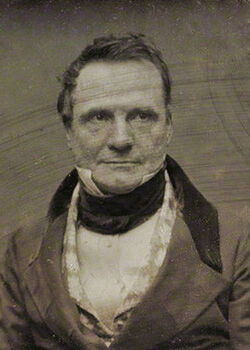Charles Babbage (nonfiction): Difference between revisions
No edit summary |
|||
| (16 intermediate revisions by the same user not shown) | |||
| Line 1: | Line 1: | ||
'''Charles Babbage FRS''' (/ˈbæbɪdʒ/; 26 December 1791 –18 October 1871) was an English | [[File:Charles Babbage by Antoine Claudet c1847-51.jpg|250px|thumb|Daguerreotype of Charles Babbage (circa 1847-1851).]]'''Charles Babbage FRS''' (/ˈbæbɪdʒ/; 26 December 1791 –18 October 1871) was an English polymath. | ||
A [[mathematician (nonfiction)|mathematician]], philosopher, inventor and mechanical engineer, Babbage is best remembered for originating the concept of a programmable computer. | |||
A [[mathematician (nonfiction)]], philosopher, inventor and mechanical engineer, Babbage is best remembered for originating the concept of a programmable computer. | |||
Considered by some to be a "father of the computer", Babbage is credited with inventing the first mechanical computer that eventually led to more complex designs. | Considered by some to be a "father of the computer", Babbage is credited with inventing the first mechanical computer that eventually led to more complex designs. | ||
| Line 15: | Line 13: | ||
In 1991, a perfectly functioning difference engine was constructed from Babbage's original plans. Built to tolerances achievable in the 19th century, the success of the finished engine indicated that Babbage's machine would have worked. | In 1991, a perfectly functioning difference engine was constructed from Babbage's original plans. Built to tolerances achievable in the 19th century, the success of the finished engine indicated that Babbage's machine would have worked. | ||
== | == In the News == | ||
<gallery> | |||
File:Ada Lovelace.jpg|link=Ada Lovelace (nonfiction)|[[Ada Lovelace]] writing unit tests for new [[Babbage simulator]], confirms Babbage. | |||
File:Analytical Engine printer.jpg|link=Analytical_Engine_(nonfiction)|Early version of [[Analytical Engine (nonfiction)|Analytical Engine]] happy to know that future versions will be even better. | |||
</gallery> | |||
== Fiction cross-reference == | == Fiction cross-reference == | ||
* [[Analytical Engine]] - any sign, [[Symbol (nonfiction)|symbol]], or [[glyph (nonfiction)|glyph]] used in a [[scrying engine]]. It is a mis-translation of the obsolete military-computational term ''analytical enseign''. | |||
* [[Babbage simulator]] | |||
* [[Gnomon algorithm]] | |||
* [[Gnomon Chronicles]] | |||
* [[Ada Lovelace]] | * [[Ada Lovelace]] | ||
* [[Mathematician]] | * [[Mathematician]] | ||
* [[Polymath]] | |||
== Nonfiction cross-reference == | |||
* [[Ada Lovelace (nonfiction)]] | |||
* [[Mathematician (nonfiction)]] | |||
* [[Polymath (nonfiction)]] | |||
== External links == | == External links == | ||
* [https://en.wikipedia.org/wiki/Charles_Babbage Charles Babbage] @ Wikipedia | * [https://en.wikipedia.org/wiki/Charles_Babbage Charles Babbage] @ Wikipedia | ||
* ''[https://en.wikipedia.org/wiki/The_Thrilling_Adventures_of_Lovelace_and_Babbage The Thrilling Adventures of Lovelace and Babbage]'' @ Wikipedia | |||
* ''[http://sydneypadua.com/2dgoggles/ The Thrilling Adventures of Lovelace and Babbage]'' @ sydneypadua.com | |||
* [http://boingboing.net/2017/05/15/paleo-hollerith.html Charles Babbage wrote a "cardboard vaporware" app in 1840 and left it in Turin] @ Boing Boing | |||
* [http://boingboing.net/2017/05/18/turn-of-the-handle.html Translate between Charles Babbage's computing jargon and modern terminology] @ Boing Boing | |||
[[Category:Nonfiction (nonfiction)]] | [[Category:Nonfiction (nonfiction)]] | ||
[[Category:Engineers (nonfiction)]] | |||
[[Category:Inventors (nonfiction)]] | |||
[[Category:Mathematicians (nonfiction)]] | [[Category:Mathematicians (nonfiction)]] | ||
[[Category:People (nonfiction)]] | [[Category:People (nonfiction)]] | ||
[[Category:Philosophers (nonfiction)]] | |||
Latest revision as of 09:02, 18 October 2020
Charles Babbage FRS (/ˈbæbɪdʒ/; 26 December 1791 –18 October 1871) was an English polymath.
A mathematician, philosopher, inventor and mechanical engineer, Babbage is best remembered for originating the concept of a programmable computer.
Considered by some to be a "father of the computer", Babbage is credited with inventing the first mechanical computer that eventually led to more complex designs.
His varied work in other fields has led him to be described as "pre-eminent" among the many polymaths of his century.
John Tucker, Professor of Computer Science at Swansea University, however, argues that it was the Welsh mathematician Robert Recorde who first laid down the foundations of these concepts.
Parts of Babbage's uncompleted mechanisms are on display in the London Science Museum.
In 1991, a perfectly functioning difference engine was constructed from Babbage's original plans. Built to tolerances achievable in the 19th century, the success of the finished engine indicated that Babbage's machine would have worked.
In the News
Ada Lovelace writing unit tests for new Babbage simulator, confirms Babbage.
Early version of Analytical Engine happy to know that future versions will be even better.
Fiction cross-reference
- Analytical Engine - any sign, symbol, or glyph used in a scrying engine. It is a mis-translation of the obsolete military-computational term analytical enseign.
- Babbage simulator
- Gnomon algorithm
- Gnomon Chronicles
- Ada Lovelace
- Mathematician
Nonfiction cross-reference
External links
- Charles Babbage @ Wikipedia
- The Thrilling Adventures of Lovelace and Babbage @ Wikipedia
- The Thrilling Adventures of Lovelace and Babbage @ sydneypadua.com
- Charles Babbage wrote a "cardboard vaporware" app in 1840 and left it in Turin @ Boing Boing
- Translate between Charles Babbage's computing jargon and modern terminology @ Boing Boing



